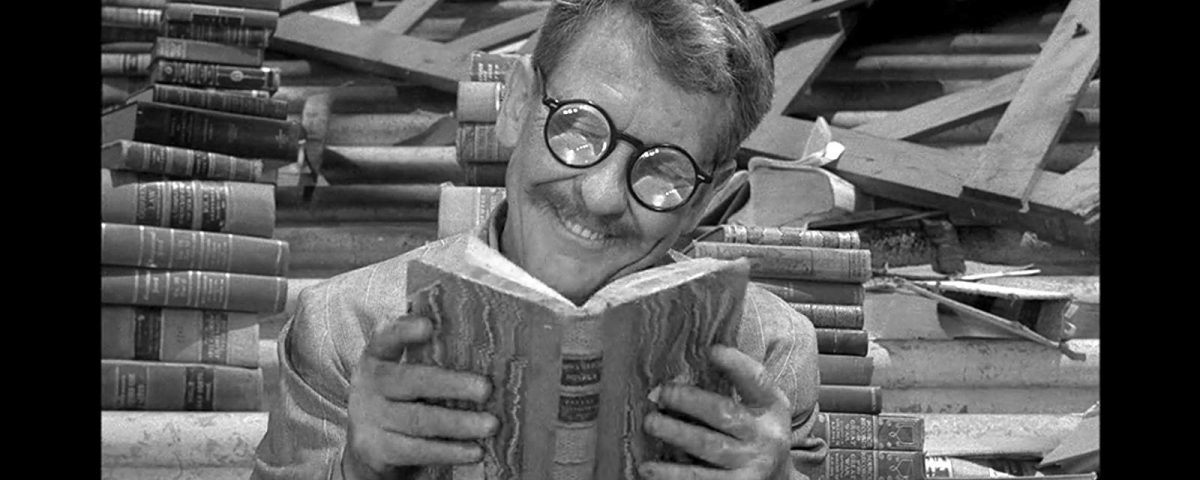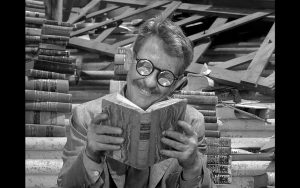The BEST: The Twilight Zone: Time Enough at Last

The BEST: The Twilight Zone: Time Enough at Last
Reviewed by Jeffrey Saks

“Witness Mr. Henry Bemis, a charter member in the fraternity of dreamers. A bookish little man whose passion is the printed page, but who is conspired against by a bank president and a wife and a world full of tongue-cluckers and the unrelenting hands of a clock,” intones Rod Serling in the opening narration of an episode of The Twilight Zone. “Time Enough at Last” aired on November 20, 1959, and played off the dark, dystopian “duck and cover” fears of its day. The episode’s antihero, myopic, bespectacled bank clerk Henry Bemis (played by Burgess Meredith), just wants to be left alone with his books. When nuclear holocaust wipes out civilization, he alone survives, having been sheltered in the bank vault where he was spending his lunch hour with David Copperfield. He tours the rubble and desolation of a world destroyed, nearly giving into loneliness and despair, when he discovers the ruins of the public library’s hoard of books, more volumes than he could read in a lifetime, and “time enough at last.” As he bends down to lift a book from the ground, his thick glasses slip off his nose and shatter, leaving him virtually blind. “That’s not fair at all. There was time now. There was… was all the time I needed! It’s not fair! It’s not fair!” he cries amid mountains of books, which will now go unread.
Based on a short story in the science fiction magazine If! (January 1953), the episode explored the dangers of anti-intellectualism, post-apocalypse scenarios, and the difference between solitude and loneliness.
[The whole episode is available here, in some locations, from the website of CBS.]
The Twilight Zone has been a perennial favorite of educators, youth group leaders, and those looking to the best of popular culture for some type of worthy insight. Its often surrealistic morality plays have been used as trigger films for decades because the very best episodes serve as a lens through which we can consider the right and just ways we live our lives, and just as often, fail to achieve our ideals. As Serling’s monotone narration stated at the opening of every episode, “The Twilight Zone” is found “between the pit of man’s fears and the summit of his knowledge.” The dystopian and apocalyptic tropes which were so common in the 1959-1964 series are engaging, entertaining, and sometimes frightening ways to consider the lives we want to live and the society we hope to build.
 These potential boons to the thinking life of a religious person aside, we should be mindful of the limits of television and the impact of the medium on the message. Episodic TV’s desire for clever twists sometimes overshadows or even subverts the important, subtle messages that can potentially enlighten. In considering the episode in hindsight, how many people remember its larger themes, and how much does the ironic twist of Bemis’ broken eyeglasses eclipse those deeper questions. (I confess, I had misremembered much of the episode, aside from the ending, until re-watching it with my son this week.)
These potential boons to the thinking life of a religious person aside, we should be mindful of the limits of television and the impact of the medium on the message. Episodic TV’s desire for clever twists sometimes overshadows or even subverts the important, subtle messages that can potentially enlighten. In considering the episode in hindsight, how many people remember its larger themes, and how much does the ironic twist of Bemis’ broken eyeglasses eclipse those deeper questions. (I confess, I had misremembered much of the episode, aside from the ending, until re-watching it with my son this week.)
“Time Enough at Last,” always a fan favorite, came to mind as we all found ourselves locked between isolation and quarantine. Even those of us housed with family members are undergoing unprecedentedly prolonged isolation from friends and colleagues, workplaces and synagogues. Assuming we are, please God, among the healthy hunkering down, how are we making the most of our “time enough at last”? Has the challenging “gift” led to increased acts of kindness, bonding with family (if we are fortunate to be together), Torah study, and other spiritually and intellectually profitable pursuits (like introducing a 12-year-old to The Twilight Zone)? Consider this: You are cast as the main character in a remake of the episode. You are the last person left in the world and the Wi-Fi cuts out (instead of your glasses shattering). How do you react?
The best laid plans of mice and men… and Henry Bemis… the small man in the glasses who wanted nothing but time. Henry Bemis, now just a part of a smashed landscape, just a piece of the rubble, just a fragment of what man has deeded to himself. Mr. Henry Bemis… in the Twilight Zone.
Rabbi Saks is the editor of TRADITION.
Click here to read about “The BEST” and to see the index of all columns in this series.
[Published March 26, 2020]

1 Comment
I am overblown by your (Jeffrey Saks) writing and the poignancy of its content!
My family and I were avid Twilight Zone fans even though they scared me.
You have inspired me to revisit some of the episodes now that I am supposedly
more mature.